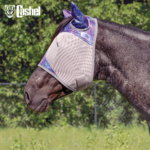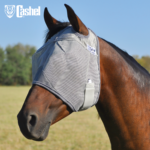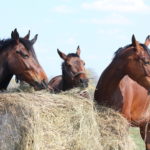It takes special care and proper nutrition to maintain optimal health of your aging horse. A well thought-out senior horse management program is essential to keeping your senior companion more comfortable and active. This includes veterinary care, proper exercise and other management precautions depending on the age, physical condition and health of senior horses.

Veterinary Care
Your veterinarian knows about the special needs and unique problems of aging horses. Regular visits by your local veterinarian become extremely important for aging horses as part of senior horse management. A suggested preventative veterinary care program for senior horses includes:
?? Yearly blood profile for kidney and liver function.
?? Regular dental checkups at least once a year, twice a year if over age 20 or with poor teeth.
?? Routine vaccinations and deworming program.
?? Orthopedic examination for muscle or skeletal problems.
?? Quick attention to any injuries or signs of illness.
Please contact your local veterinarian to learn more about caring for the health of your aging horse.
Dental Problems
Horses may develop various dental problems as they grow older. These conditions can interfere with the horse’s ability to chew feed, reduce digestion and ultimately affect the horse’s health. The molars at the rear of the horse’s mouth do the chewing, and are where old age takes its greatest toll. In addition, reduced salivation also prevents older horses from properly moistening their feed/hay which may impede swallowing and digestion.
Clues your horses may have a dental problem? Weight loss, spilled feed, wads of partially chewed hay (quidding) or feed dropping from the mouth, or undigested grain in the manure.
Purina? Equine Senior? Horse Feed delivers critical nutrients your older horse needs and with its special blend of fiber sources, Equine Senior? horse feed can replace all or some of the hay/pasture in the diet. If your older horse cannot eat hay or is having trouble digesting his meals, this formula can help.
The pelleted feed is easy to chew and the Easy-Soak? Pellet Technology allows you to create a mash with warm water in only five minutes. This is perfect for the horse with significant dental problems or missing teeth. This unique product provides all the nutrition and the roughage your older horse requires, and horses love the taste.
Regular dental checkups are recommended at least twice a year (at least once a year for horses with good teeth or under age 20).
Digestive Disorders
Poor digestion is a major concern. As horses age, there may be a reduction in saliva production. And with the relatively small size of a horse’s stomach (1-2 gallons) and the reduced absorption in an aged horse’s digestive tract, it becomes difficult for high bulk feeds such as hay and whole grain feeds to be properly processed. In addition, as a horse ages, digestion and absorption may diminish resulting in reduced absorption of nutrients and more feed and hay passing through undigested.
Equine Senior? horse feeds are mixtures of pellets and nuggets containing more digestible, high-quality ingredients and are therefore more easily absorbed in the digestive tract. The special blends of fiber sources help maintain the senior horse’s body condition and aid in normal digestive function.
Suggestions:
?? If possible, feed older horses separately.
?? Be careful that younger horses don’t eat all the feed.
?? Change diet gradually.
?? Slow a greedy eater by placing large, rounded stones or salt blocks in feed container and by spreading feed out in a larger trough.
?? More frequent, smaller meals at least 2-3 times a day.
?? When feeding hay use good quality, leafy, early cut hay. It is more nutritious, easy to chew and won?t unduly tax the digestive system
Poor Hair Coat
Hair coat quality and skin condition often decline in aging horses, becoming dry, shaggy and dull. The patented high fat Purina? Amplify Nugget contains a proprietary blend of plant oils, flax seed, and rice bran for an optimal fatty acid profile. Through the balanced nutrition and fatty acid profile, Equine Senior? horse feeds help promote healthier coats, skin and hooves.
Lameness
Older horses may have a variety of lameness problems due to wear and tear, improper hoof care, inadequate nutrition, environmental stresses and deteriorating health. The older a horse gets, the more easily the legs and hooves are affected by changes in routines and surroundings. Studies show that inadequate nutrition can lead to lameness. In addition, it has been suggested that phosphorus can be poorly absorbed in older horses. There is also a high incidence of calcium-oxalate crystals in the urine and a potential for stone formation in the kidney. The older horse may be less tolerant to variations in optimal calcium/phosphorus levels in their diets than when they were younger.
The aging process sometimes results in bone and joint deterioration, including the onset of arthritis. Equine Senior? horse feeds provide adequate levels of high quality protein, and proper amounts of calcium, phosphorus, vitamins and trace minerals that are required by the older special needs equine and the active aging equine.
Suggestions:
?????? Avoid obesity and heavy loads because extra weight burdens aging joints, tendons and ligaments. Overweight horses may also be prone to laminitis (founder).
?????? Have a reliable farrier provide routine hoof care every 6?8 weeks.
?????? Provide regular, moderate exercise. Gradual workouts at least four times a week are recommended. Avoid fast changes in exercise, duration or intensity. Ride or walk on softer surfaces such as grass or light, sandy soil if lameness is a problem.
Respiratory Problems
Many horses suffer respiratory problems as they grow older. Older horses often develop allergic respiratory diseases. Molds and dust from grains and hay can further aggravate their condition. The original Purina? Equine Senior? horse feed is easy to chew and is much less dusty than whole grains and long-stemmed hay. Purina? Equine Senior? horse feed is a ?complete feed? with top-quality hay and fiber sources built in, giving you total control of your horse’s ration without the need for hay or pasture. Creating a mash may also help alleviate dust that can aggravate respiratory problems. Suggestions:
?????? Avoid excessive exercise.
?????? Keep pasture mowed if horse is allergic to outdoor pollens.
?????? Provide adequate ventilation in stalls and barns.
?????? Do not use dusty bedding.
?????? Replace potentially dusty, moldy hay with original Purina? Equine Senior? to provide all your horse’s feed and forage needs.
?????? Consult your veterinarian to determine if anti-inflammatory medications or other medical interventions are indicated.
Higher Protein Requirements
As horses age, they begin to lose muscle mass and experience reduced digestion of crude protein. Older horses need a higher level and quality of protein to compensate for the reduced function of the digestive tract. Equine Senior? horse feeds are formulated with high quality, highly digestible 14% protein which helps provide all the essential amino acids needed by aging horses.
Increased Blood Sugar
Research has shown that some older horses suffer from glucose intolerance due to pituitary tumors. This may be complicated by the glucose and other soluble carbohydrates found in grain diets, which suggests a need for a higher fat and higher digestible fiber diet. The Equine Senior? horse feeds have more calories from fats and fibers, less from sugar to help provide a diet lower in nonstructural carbohydrates that may help aging horses better manage blood sugar levels.
Suggestions:
?????? Increased level of vegetable oils, the naturally occurring oils in rice bran and flax seed and highly digestible fiber. These vegetable oils and fermentable fibers provide excellent, highly-digestible, alternate energy sources for older horses.
?????? Low grain inclusion; the ground alfalfa and beet pulp in the pellet provide readily digestible, high-quality fiber which serves as an energy source.
Declining Body Condition
As horses age, their metabolism is altered. They usually fall into one of two categories:
?????? Easy Keepers ? Reduced metabolism and activity result in excessive weight gain that can be hazardous to the horse’s health.
?????? Hard Keepers ? Loss of body weight, condition, and muscle mass caused by reduced digestive efficiency and medical problems affecting metabolic rates.





